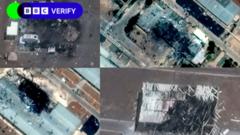**In a significant escalation of military actions, Israel has targeted key nuclear facilities in Iran, threatening broader regional stability amid warnings of potential Iranian retaliation.**
**Israel Launches Extensive Strikes on Iran's Nuclear Facilities Amid Rising Tensions**

**Israel Launches Extensive Strikes on Iran's Nuclear Facilities Amid Rising Tensions**
**Security and military analysts assess the wide-ranging Israeli offensive targeting Iran's nuclear program and military infrastructure following escalated tensions.**
June 13, 2025, 2:45 p.m. ET — In a dramatic act of aggression, Israel has initiated a comprehensive military operation against Iran, striking pivotal nuclear sites as well as military installations throughout the country. The attacks began early in the morning and have continued throughout the day, with Israel claiming significant damage to Iran's nuclear capabilities and key military leadership.
Israeli officials assert that their Air Force has successfully targeted approximately 200 locations, including major nuclear enrichment facilities in Natanz and Isfahan, aiming to dismantle Iran's ability to develop nuclear weapons. In the face of these strikes, Iranian leadership has vowed retaliation, expressing outrage and calling for severe consequences for what they describe as a "declaration of war."
Israeli Prime Minister Benjamin Netanyahu characterized the strikes as a necessary measure for national security, asserting that Iran poses an existential threat to Israel. He stated that the operations would continue "as long as it takes" to neutralize that threat. With the death of several top military commanders in the strikes, including General Esmail Ghaani and other leading figures of the Iranian Revolutionary Guards, the Iranian government has moved quickly to reinforce its military hierarchy to avoid a leadership vacuum.
As tensions escalate, President Trump has also weighed in, urging Iran to agree to new limitations on its nuclear activities and threatening even harsher reprisals should negotiations fail. Trump's administration recently engaged in direct talks with Iranian officials, but those discussions now appear to be at an impasse. Trump hinted that the continuing onslaught signifies a strategic pivot, encouraging Iranian hardliners to reassess their stance.
The international community has reacted with mounting anxiety, as countries across Europe express their concern over the escalating conflict. Key allies of Israel, including the United States and representatives from various European nations, have called for immediate de-escalation of military actions. On the ground in Israel, citizens are urged to stockpile supplies and prepare for possible retaliation, amid widespread jitters following air raid sirens and rising fears of drone attacks from Iranian territory.
Furthermore, the strikes targeting Iran's military assets indicate a well-coordinated effort by Israeli intelligence, which has reportedly spent the past year preparing for this offensive. The operation represents a substantial strategic shift, moving from covert intelligence operations to overt military action, with significant implications for regional stability and the future of Iran's nuclear program.
In conclusion, while Israel has bolstered its military positions and intervened decisively to preempt an Iranian nuclear threat, the unfolding situation carries the risk of igniting a broader conflict in the Middle East. The international community is closely monitoring the situation, and any further Iranian responses could trigger an escalation that reshapes political dynamics across the region.
Israeli officials assert that their Air Force has successfully targeted approximately 200 locations, including major nuclear enrichment facilities in Natanz and Isfahan, aiming to dismantle Iran's ability to develop nuclear weapons. In the face of these strikes, Iranian leadership has vowed retaliation, expressing outrage and calling for severe consequences for what they describe as a "declaration of war."
Israeli Prime Minister Benjamin Netanyahu characterized the strikes as a necessary measure for national security, asserting that Iran poses an existential threat to Israel. He stated that the operations would continue "as long as it takes" to neutralize that threat. With the death of several top military commanders in the strikes, including General Esmail Ghaani and other leading figures of the Iranian Revolutionary Guards, the Iranian government has moved quickly to reinforce its military hierarchy to avoid a leadership vacuum.
As tensions escalate, President Trump has also weighed in, urging Iran to agree to new limitations on its nuclear activities and threatening even harsher reprisals should negotiations fail. Trump's administration recently engaged in direct talks with Iranian officials, but those discussions now appear to be at an impasse. Trump hinted that the continuing onslaught signifies a strategic pivot, encouraging Iranian hardliners to reassess their stance.
The international community has reacted with mounting anxiety, as countries across Europe express their concern over the escalating conflict. Key allies of Israel, including the United States and representatives from various European nations, have called for immediate de-escalation of military actions. On the ground in Israel, citizens are urged to stockpile supplies and prepare for possible retaliation, amid widespread jitters following air raid sirens and rising fears of drone attacks from Iranian territory.
Furthermore, the strikes targeting Iran's military assets indicate a well-coordinated effort by Israeli intelligence, which has reportedly spent the past year preparing for this offensive. The operation represents a substantial strategic shift, moving from covert intelligence operations to overt military action, with significant implications for regional stability and the future of Iran's nuclear program.
In conclusion, while Israel has bolstered its military positions and intervened decisively to preempt an Iranian nuclear threat, the unfolding situation carries the risk of igniting a broader conflict in the Middle East. The international community is closely monitoring the situation, and any further Iranian responses could trigger an escalation that reshapes political dynamics across the region.





















